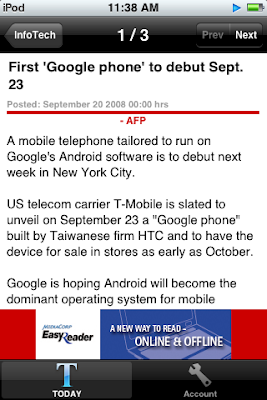This story is just too overwhelmingly big to ignore. Whether you are interested in tech or not, I believe you should have heard about computer software giant Microsoft's bid to buy over Yahoo for $44.6B.
News articles about what this means, whether Yahoo should take the offer or not and Google's response etc. are popping up everywhere, both in print and online media. It's hard for me to be ignorant of what's happening, so I decided I should say something, though I must qualify that I'm not in the most knowledgeable position to offer a compelling argument. Much of this is related to business tactics, which I know little of.
First, one must know that this isn't the first time Microsoft is doing this... Yahoo has rejected a
previous offer a year ago, 'confident about the "potential upside" presented by the reorganisation and operational activities that were being put in place then.'
Obviously, Microsoft won't give up, and this move is unexpected and aggressive too. Why? Because now that former CEO Bill Gates has stepped down, and Steve Ballmer is now in charge, he is starting to show his true colours as 'a fighter, willing to do what it takes to win' (in the words of
Paul Thurrott). I can tell that Microsoft, or at least Ballmer, so badly wants to outdo search giant Google in areas of search-based text advertising, cloud computing and internet search, which are currently churning millions for Google. This time round, he's clearly being hostile.
In fact,
a report mentioned that he 'vowed to "kill" internet search leader Google Inc. in an obscenity-laced tirade, and Google chased a prized Microsoft executive "like wolves," according to documents filed in an increasingly bitter legal battle between the rivals.' He was even quoted saying
"I'm going to fucking bury that guy, I have done it before, and I will do it again... I'm going to fucking kill Google."So how will the merger help Microsoft win the battle against Google, and hence gain dominance on the internet? Paul Thurrott (yup him again) provides a logical (and lengthy) explanation which I shall not try to paraphrase:
To quote:
'So if Microsoft isn't interested in Yahoo's technology, why merge? Even though a combined Microsoft and Yahoo would not equal the market share and search ad revenues of Google, it does provide Microsoft will a much-needed market share boost that will make its online platform more credible to advertisers and thus will raise ad revenues, which, by the way, is how all these companies make money on this stuff in the first place. Yahoo also brings its ingrained vision for cloud computing, a business model Microsoft has not fully embraced because of the success of its traditional PC products. So even if what we're left with is a familiar-sounding set of Windows Live services, those services will hopefully be influenced and improved by the ranks of Yahoo employees that will flood Microsoft's online business. And for whatever its worth, Microsoft may trash cloud computing in public, but the scope of this deal--which seems specifically designed to ensure that Yahoo can't say no--suggests that Microsoft takes the Google cloud computing threat very, very seriously. Put another way, Microsoft's actions speak louder than its words.'Make no mistake that this is a huge offer, that if accepted, is going to affect every single user who uses the web, in one way or another. It could affect Yahoo Mail/Windows Live Mail, or even Yahoo Messenger/Live Messanger... But ideally, both parties should aim for a win-win situation, and this offer should not be simply dismissed as another futile acquisition like the previous attempt, but consider the possibilities when Windows Live merges with Yahoo's services. Then, there would be much more competition for Google, and as we all know, a monopoly isn't good and at times, a healthy dose of competition would keep companies on their feet to constantly improve their services and offer the best for consumers.
Google responds:This being said, all that every company cares about, at the end of the day, are profits. Hence, it is natural that Google disapproves of the merger to protect its hefty share of the online search-advertising market.
Forbes reports that on Sunday, Google accused Microsoft of its unfair tactics in dominating the internet. David Drummond, chief legal counsel for Google wrote in a blog entry: "Could Microsoft now attempt to exert the same sort of inappropriate and illegal influence over the Internet that it did with the PC? While the Internet rewards competitive innovation, Microsoft has frequently sought to establish proprietary monopolies--and then leverage its dominance into new, adjacent markets."
This report also wrote that 'soon after Google lobbed its shot at Microsoft, the Redmond, Wash.-based software giant issued a rebuttal. "The combination of Microsoft and Yahoo! will create a more competitive marketplace by establishing a compelling number two competitor for Internet search and online advertising," Microsoft General Counsel Brad Smith said in a statement. "The alternative scenarios only lead to less competition on the Internet. Microsoft is committed to openness, innovation and the protection of privacy on the Internet. We believe that the combination of Microsoft and Yahoo! will advance these goals."'
-----------------------------------------------------------------------
I believe there's so much more to discuss about, you can read and find out, but I shall stop here for now, this is cheem stuff... tell me what you think!


